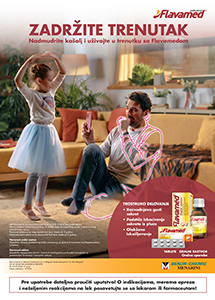TREATMENT OF SYMPTOMS AND PREVENTION OF RESPIRATORY INFECTION IN CHILREN WITH DIETARY SUPPLEMENT – EFFICIENCY AND QUALITY OF LIFE
DOI:
https://doi.org/10.46793/PP180312012PKeywords:
cough, children, PropoMucil® syrupAbstract
Introduction. In the winter period, the presence of respiratory infections of viral and bacterial origin in children is high. Phytotherapy, which is a combination of herbal preparations, has a role in the treatment of standard therapy. The aim of our research is to assess the quality of life of parents and the efficiency of PropoMucil® syrup used by children with respiratory infections.
Patients and Method: The research was conducted in University Hospital Center „Dr Dragiša Mišović“, Dedinje - Children's Lung Disease and TB in a period from December 2016. to February 2017. The research was done using a questionnaire that was filled based on the response of the parents of children with cough. The questionnaire consisted of three parts. The first part of questionnaire was related to demographic data, second part was related to the characteristics of cough and the third part was related to the quality of life of parents of children with cough.
Results. The study included 75 children who, according to age, were devided in two groups, group of pre-school age (group A) and group of schol age (group B). By gender, they did not have a statistically significant difference. A statistically significant differeence was between groups relative to their age when they went to the collective. Group A had a higher number of respiratory infections lasting more than two years in regard to Group B. In group A, cough didn’t disturb children in daily activities (77,6%). In group B, 57,7% of cases of cough disrupted daily activity, but this number was reduced by 11,5% after the treatment. Also, in group B, 15,4% more children didn’t have night symptoms after the application of syrup. The cotrol examination showed difference in compliance, group A wes taking syrup (59,2%), while gruop B took syrup in a significantly higher percentage (92,3%). Regarding to the quality of life in the family with child with the cough, a statistically significant difference wasn’t noticed.
Conclusion. Phytotherapy takes important place in the prevention and treatment in high frequency diseases. Our reserach confirmed that PropoMucil® syrup for children is efficient and safe for use in all age groups, and significantly improves quality of life both children and parents.
References
Smith KR, Samet JM, Romieu I. et al. Indoor air pollution in developing countries and acute lower respiratory infections in children. Thorax 2000; 55(6):518-532.
Johnston SL, Pattemore KP, Sanderson G. et al. "Community study of role of viral infections in exacerbations of asthma in 9-11 year old children." BMJ 1995; 310.6989, 1225-1229. https://doi.org/10.1136/bmj.310.6989.1225
Jain S, Williams JD, Arnold RS. et al. "Community-acquired pneumonia requiring hospitalization among US children." N Engl J Med 2015; 372.9:835-845. DOI: 10.1056/NEJMoa1405870
Zharkova NE. Kashel': prichiny, diagnostika, lechenie. Russkii meditsinskii zhurnal. 2006; 6: 1171–1174.
Klyachkina IL. Eshche raz o mukolitikakh. Consilium medicum 2008; 10 (3): 124–128.
Mateescu I, Paun L, Popescu S. et al. "Medicinal and aromatic plants-a statistical study on the role of phytotherapy in human health." Bulletin of University of Agricultural Sciences and Veterinary Medicine Cluj-Napoca. Animal Science and Biotechnologies 2014;71.1:14-19.
Veković V, Korčok D, Stojanović J. et al. Iskustva sa biljnim preparatima u terapiji kašlja kod dece. Timočki glasnik 2015; 40, 4: 248-258.
Bajec-Opancina A, Subarevic V, Stankovic K. et al. Comparative Study of PropoMucil® For the Treatment of Acute Respiratory Infections of the Upper Respiratory Tract in Children. Preventive pediatrics, 2017; 3(1-2): 63-69.
Katzung BG. Basic and clinical pharmacology. 2007 (10th edn.); 964-965.
Cuparencu B. Textbook of fundamental and clinical pharmacology. Groupromo Edition. 2003; 2: 719-722.
Blasi F, Page C, Rossolini MG. et al. The effect of N-acetylcysteine on biofilms: Implications for the treatment of respiratory tract infections. Respir. Med 2016; 117:190-7. https://doi.org/10.1016/j.rmed.2016.06.015
Castro I, Sanz ML, Gonzalez M. et al. Carbohydrate composition and physico chemical properties of artisanal honeys from Madrid (Spain): occurrence of Echium sp. honey. Journal of the Science of Food and Agriculture 2004;84(12):1577–84. https://dx.doi.org/10.1002/jsfa.1823
Tonks AJ, Cooper RA, Jones KP. et al. Honey stimulates inflammatory cytokine production from monocytes. Cytokine 2003;21(5):242–7. https://doi.org/10.1016/S1043-4666(03)00092-9
Golob T, Doberšek U, Kump P. et al. Determination of trace and minor elements in Slovenian honey by total reflection x-ray fluorescence spectroscopy. Food Chemistry 2005;91(4):593–600. https://doi.org/10.1016/j.foodchem.2004.04.043
Yukse S, Akyol S. The consumption of propolis and royal jelly in preventing upper respiratory tract infections and as dietary supplementation in children. J Intercult Ethnopharmacol. 2016; 5(3): 308-311. https://dx.doi.org/10.5455%2Fjice.20160331064836
Chirumbolo S. Anti-inflammatory property of propolis. J Clin Biochem Nutr. 2015; 56(2): 163-4. https://doi.org/10.3164/jcbn.14-110
Wojtyczka RD, Kepa M, Idzik D. et al. In Vitro Antimicrobial Activity of Ethanolic Extract of Polish Propolis against Biofilm Forming Staphylococcus epidermidis Strains. Evid Based Complement Alternat Med. 2013; Volume 2013, Article ID 590703, 11 pages. http://dx.doi.org/10.1155/2013/590703
Bajec-Opancina A. Subarevic V, Stankovic K. et al. Efficiency of Propolis and N-acetylcisteine for the Treatment of Acute Respiratory Infections in Children.MD-Medical Data 2017; 9(3): 149-153.
EMEA WHO monographs - European Union herbal monograph on Althaea officinalis L., radix. Committee on Herbal Medicinal Products (HMPC). 2015: EMA/HMPC/436679/2015.
Al-Snafi EA. The pharmaceutical importance of Althaea officinalis and Althaea rosea: A review. Int J Pharm Tech Res 2013:5(3):1387-1385.
Fan C, Pacier C, Martirosyan MD. Rose hip (Rosa canina L): A functional food perspective. Functional Foods in Health and Disease. 2014; 4(11):493-509.
Zujovic D. The Randomized, Double-Blind, Placebo-Controlled Study of Efficacy and Safety of Propolis and N-Acetylcysteine Compared to Placebo in Adults in Acute Condition with Sputum Production. American Journal of Respiratory and Critical Care Medicine 2017;195: A2675.
Agić A, Korčok D, Lazović B. Herbal Medicine in Acute Respiratory Infections. MD-Medical Data 2017;9(4): 213-217.
Landau LI. Acute and chronic cough. Paediatric Respiratory Reviews 2006;7(1):64–7.





